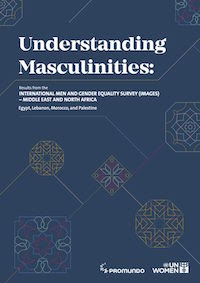May 1, 2017 Men in the Middle East and North Africa are at a crossroads, reveals ground-breaking multi-country study on the state of gender equality in the the Middle East and North Africa region.
Promundo and UN Women’s multi-country study in the Middle East and North Africa (MENA) ? covering Egypt, Morocco, Lebanon, and Palestine  ? launches in Beirut, Lebanon today as part of the “Masculinities in the Arab World” conference, revealing the reality of men’s lives behind the headlines.
? launches in Beirut, Lebanon today as part of the “Masculinities in the Arab World” conference, revealing the reality of men’s lives behind the headlines.
The International Men and Gender Equality Survey in the Middle East and North Africa (IMAGES MENA), produced by Promundo and UN Women in collaboration with local research partners, is the first study of its kind and size in the region to take a wide-angle, comparative lens to the lives of men ? as sons and husbands and fathers, at home and at work, in public and private life ? to better understand how they see their positions as men, and their attitudes toward gender equality.
Key findings on men and gender equality in the MENA region:
- Although traditional attitudes about gender equality dominate, at least one-quarter of men hold more open and equitable views, supporting certain aspects of women’s economic, social, and political equality.
- There is evidence for inter-generational cycles of violence. In all four countries, men who witnessed their fathers using violence against their mothers, and those who experienced some form of violence at home as children, were significantly more likely to report perpetrating intimate partner violence in their adult relationships.
- There is also evidence for inter-generational cycles of care. In all four countries, men whose fathers had participated in traditionally feminine household work, as well as men who were taught to do this work as children, were far more likely to report contributing in this way within their own marriages.
- High rates of depressive symptoms are evident for women and men. For the 20 to 28 percent of men who report depressive symptoms, effects of conflict and unemployment were frequently cited as reasons or aggravating factors.
- Younger men are not leading the way when it comes to support for gender equality. While young women are showing more progressive views towards equality than the older generation, this is not the case for younger men.



Leave a Reply